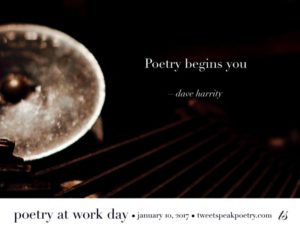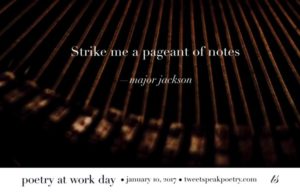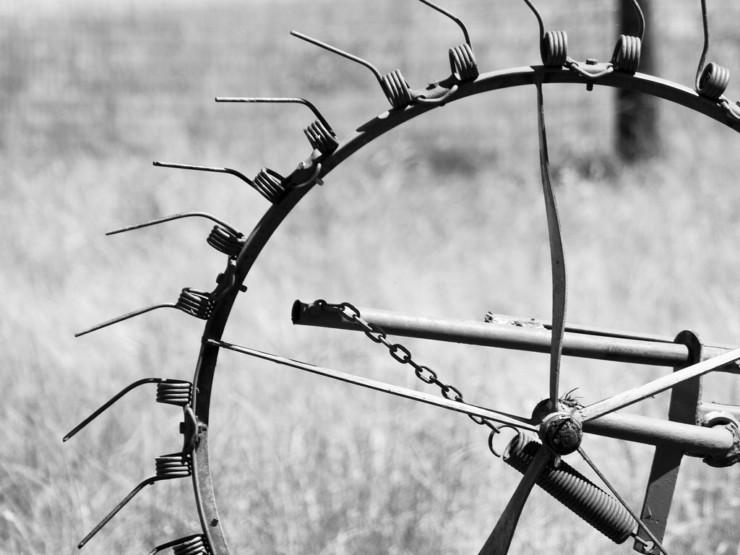It’s Poetry at Work Day 2017.
And I have a confession.
This is now the fifth year that Tweetspeak Poetry has sponsored Poetry at Work Day. I’ve written about it and celebrated it. I even wrote a book called Poetry at Work.
My confession: Associating poetry with work still sounds strange to me.
The first connection between poetry and work was made for me. I was part of the speechwriting team at my company, and a friend gave me three poetry collections. “You can’t write speeches unless you know T.S. Eliot, Dylan Thomas, and Wallace Stevens, ” he said. These three great modern poets helped shape not only poetry and literature but also speechwriting.
I knew that some speakers often quoted or recited poems in their speeches. But I didn’t yet know that poetry was actually in the work of writing a speech.
In 1994, I read David Whyte’s The Heart Aroused: Poetry and the Preservation of the Soul in Corporate America. It seemed an odd book—a Welsh-born poet talking about saving one’s soul while working for a large corporation. I read it because the title appealed to me, and for another reason.

A few years later, I was in one of those interminable meetings at work. They are perhaps the most common feature of corporate work life—recurring meetings designed to cover all bases (and cover other things as well), reach consensus, and make sure everyone was accountable for the final decision.
These meetings often made me want to scream. Their sheer repetitiveness was grounds for justifiable homicide.
I even remember the particular meeting room—an interior, windowless room with a screen at one end and enough chairs to accommodate 10 people. I would attend because I had to, but I grew adept, as did others, at appearing engaged but in reality being in another world altogether. For a brief moment, my mind wandered into the meeting, and I heard statements that were identical to what had been said the week before.
And that’s when it clicked, right in the middle of the ordinary, repetitive, numbing meeting. The meeting was like a poem filled with repetition, with words and phrases mentioned over and over, week after week. I was living a poem.
Right at that moment, the angle of the world shifted for me. And I saw exactly what Whyte had been talking about. Work, all work, including these awful and boring meetings, was filled with poetry. It was as if what had been white background noise suddenly burst into a wild and joyful symphony.

So look for it, find it, study it, and write about it. Write the poem that is in the work you do. And come back here and let us know in the comment section what you found. We’ll select one (or two) and give the selected poets a copy of Poetry at Work.
But, most of all, celebrate with us. Find the poetry in the work you do. It’s there.
Photo by Jeff Jones, Creative Commons, via Flickr. Post by Glynn Young, author of the novels Dancing Priest and A Light Shining, and Poetry at Work.
__________________________

“I require all our incoming poetry students—in the MFA I direct—to buy and read this book.”
—Jeanetta Calhoun Mish
- Poets and Poems: Katie Kalisz and “Flu Season” - April 15, 2025
- Poets and Poems: Michelle Ortega and “When You Ask Me, Why Paris?” - April 10, 2025
- Robert Waldron Imagines the Creation of “The Hound of Heaven” - April 8, 2025

Dawn says
Hmmm… I’m intrigued. Life is poetry … all of it, it finds us wherever we are. Oddly I work from home now…without pay. This is calling me to write so I hope to come back later and share ….fingers crossed! The book ( pilgrimage…) sounds fascinating – the title itself worth pondering! Thanks for sharing again, faithfully!
Glynn says
Working from home without pay – that sounds like a poem (at least one) to me. Thanks for the comment, Dawn!
Jan Kaan says
i don’t feel qualified to talk about my work
Buster Keaton once said
i’m glad I’m able to say the same
’cause a writer is no speaker
at heart and though a poet
might be a seeker of new ways
in essence the blank page is
what stays
through my work i see things
i feel alive and spend this earthly
time that sets
to be satisfied
become what i’m already
a thinker of things
a smiler on wings
with no regrets
Bethany says
Jan, I’m glad you shared this poem with the Tweetspeak Poetry community. (Welcome, by the way!)
These lines resonated with me:
“…though a poet
might be a seeker of new ways
in essence the blank page is
what stays”
Glynn says
Jan – thank you for the poem!
Laura Lynn Brown says
Glynn, thanks for listing David Whyte’s book Crossing the Unknown Sea. I’ve borrowed it from the library and I’m bumping it up ahead of a few other books in the next-in-line-for-takeoff stack.
Glynn says
I loved the book. I still do. Whyte spoke of the corporate environment in ways I hadn’t heard before but were totally recognizable from my own experience.
L.L. Barkat says
I got a call from an Ohio radio show host, at 6:30 am today, and he wanted to know what inspired Poetry at Work Day. I told him your “boring meeting” story. (He loved that. And he said probably lots of people who are doodling in meetings are now going to say, “I was writing a poem!”)
🙂
Bethany says
Hahaha! Oh my goodness, how exciting, Laura. 🙂 Love to hear the word getting out about Poetry at Work Day.
L.L. Barkat says
Each year is so different. It’s always fun to see who shows up, what happens, where and how poetry makes its way. The Day has been celebrated from Italy to Argentina, from South Africa to England. Ellen DeGeneres wrote a poem for it one year. And Stephen Colbert made a fun joke about the sonnet mines last year, for the occasion. The Smithsonian, the National Parks Service, NASA, the list goes on. Even a mammoth (but it looks like this year he was fresh out of poems 🙂 )
Glynn says
We make make boring meetings (as if they weren’t already)!